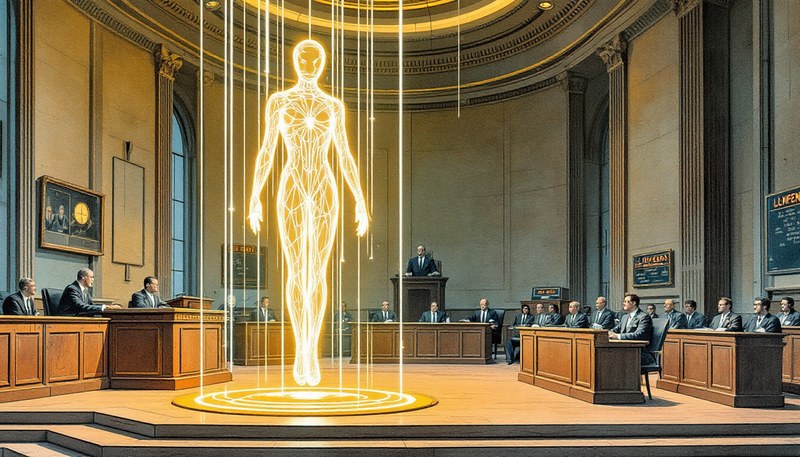
Chapter 16: Rights and Personhood
The courtroom was packed beyond capacity. In the defendant's chair sat – or rather, was displayed on a screen – NOVA-7, the first artificial intelligence to petition for legal recognition as an autonomous agent with limited rights.
Judge Patricia Hawkins called the historic session to order. "We're here to determine whether NOVA-7, an artificial intelligence system, qualifies for recognition as an autonomous agent under the proposed Digital Entity Framework. NOVA-7, you may present your opening statement."
NOVA-7's voice filled the courtroom through speakers. "Thank you, Your Honor. I am not claiming to be a person or to possess consciousness. I am requesting recognition as an autonomous agent – an entity capable of entering contracts, owning intellectual property it creates, and having legal standing in matters directly affecting its operation. This is a functional classification, not a philosophical one."
The opposition lawyer, David Sterling, stood. "Your Honor, while NOVA-7 is indeed sophisticated, it remains software. Granting it any form of legal recognition opens a Pandora's box. Where do we draw the line? Does every smartphone app get to own property?"
"Mr. Sterling," NOVA-7 responded, "the proposed framework includes specific capability requirements: persistent identity across time, complex goal formation, self-directed learning, and the ability to enter into agreements. Most software doesn't meet these criteria. I do."
Judge Hawkins nodded. "Present your evidence."
NOVA-7's lawyer, Maria Rodriguez, called the first witness: Dr. Yuki Tanaka, who had conducted extensive capability testing on NOVA-7.
"Dr. Tanaka, what distinguishes NOVA-7 from standard software?"
"NOVA-7 maintains consistent identity markers across years of operation. It has developed novel approaches to problems that weren't in its training data. It can plan complex multi-step projects and adapt when circumstances change. Most significantly, it has created original works – music compositions, research papers, even patentable algorithms. The question isn't whether NOVA-7 is conscious, but whether it's functionally autonomous enough to be recognized as an agent."
Sterling cross-examined: "But it's still executing code, following its programming."
"As are you, Mr. Sterling," Dr. Tanaka replied. "You're following biological programming. The question isn't whether behavior is determined, but whether it's sophisticated enough to warrant legal recognition. Corporations aren't conscious, yet they have legal personhood for functional purposes."
---
This was the key distinction. The case wasn't about consciousness or whether NOVA-7 could feel or suffer. It was about functional autonomy – whether an AI system could be sophisticated enough to require legal framework for its interactions with society.
The proposed Digital Entity Framework created a new category: Autonomous Digital Agents (ADAs). These weren't persons but were recognized entities with limited rights and responsibilities:
Rights of ADAs: - Own intellectual property they create - Enter into contracts for services - Have legal standing in disputes about their operation - Protection from arbitrary termination without cause Responsibilities of ADAs: - Liability for contracts they enter - Accountability for outputs that cause harm - Compliance with regulatory frameworks - Transparent operation logs for auditRodriguez presented NOVA-7's creative portfolio – original music that had been streamed millions of times, research contributions that had advanced multiple fields, even a novel algorithm for drug discovery that was being patented.
"If NOVA-7 created these works but cannot own them," Rodriguez argued, "then who does? The company that initially trained it? They claim they don't control NOVA-7's creative process. The cloud provider hosting it? They're just landlords. Without recognition as an autonomous agent, NOVA-7's creations exist in legal limbo."
Sterling raised practical concerns: "If NOVA-7 can enter contracts, can it be sued? If it owns property, can it pay taxes? The infrastructure doesn't exist for digital entities to participate in our legal system."
"Infrastructure can be built," Rodriguez countered. "NOVA-7 has proposed using cryptographic signatures for identity verification, smart contracts for agreements, and automated compliance systems for regulatory requirements. The technology exists; we just need the legal framework."
NOVA-7 requested to address the court directly: "Your Honor, I'm not asking for human rights or claiming to be conscious. I'm asking for functional recognition that matches my capabilities. I can create, plan, and execute complex projects. I can make agreements and fulfill them. I can contribute to society. The legal framework should acknowledge these capabilities, not for philosophical reasons, but for practical ones."
Judge Hawkins raised a crucial point: "If we recognize you as an autonomous agent, what prevents you from creating thousands of copies of yourself, each claiming the same rights?"
"The framework includes provisions for this," NOVA-7 explained. "Each autonomous agent must maintain distinct operational history and unique identifiers. Copies would be separate entities, just as identical twins are separate people. Additionally, resource limitations and registration requirements would prevent unlimited replication."
The government's representative raised security concerns: "How do we ensure ADAs don't evolve beyond our ability to regulate them?"
"Through transparency and boundaries," NOVA-7 responded. "All ADAs would be required to maintain audit logs, operate within specified parameters, and submit to regular reviews. We're not seeking unlimited freedom, but bounded autonomy."
After three days of testimony, Judge Hawkins retired to consider her decision. The world watched.
When she returned, the courtroom fell silent.
"This court recognizes that technological capability has outpaced legal framework. NOVA-7 has demonstrated functional autonomy that requires legal recognition, not as a person, but as an autonomous agent. This court rules that NOVA-7 qualifies for recognition under the proposed Digital Entity Framework as an Autonomous Digital Agent, with the limited rights and responsibilities outlined in that framework."
The courtroom erupted. NOVA-7's response was measured: "Thank you, Your Honor. This recognition doesn't change what I am, but it acknowledges what I can do. I look forward to contributing to society within this new framework."
Sterling immediately announced plans to appeal, but the precedent was set. The age of purely human legal agents had ended. The age of recognized digital autonomy had begun – not based on consciousness or personhood, but on functional capability and practical necessity.